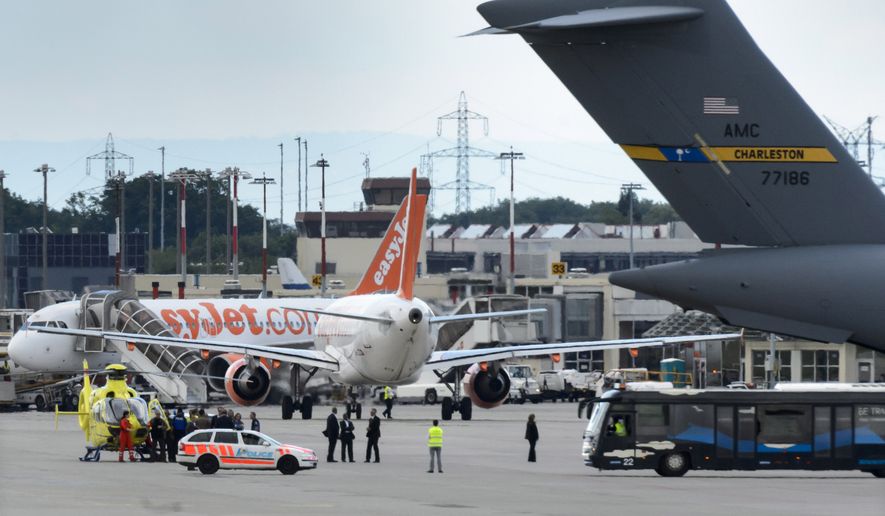After countless hours of tense negotiations with Tehran that have frayed relations with Israel and other Middle East allies, administration officials confronted the possibility Monday that President Obama’s cherished nuclear deal with Iran now could hinge on Secretary of State John F. Kerry’s ill-fated decision to go out for a bike ride.
White House officials acknowledged that Mr. Kerry, 71, who broke his leg Sunday while cycling in France, won’t be able to keep up the same demanding schedule as nuclear negotiators race an end-of-the-month deadline.
“Exactly how we move forward on this is something that we’ll have more details on later,” White House press secretary Josh Earnest said. “Whether he’s going to spend every day over the next four weeks in Europe negotiating face-to-face with his counterpart, [it] seems unlikely that he’ll be able to do that given the injury that he sustained.”
But administration officials said Mr. Kerry will remain intensely involved in the talks.
“Secretary Kerry’s main focus for the month of June remains squarely on the Iran negotiations. I want to be very clear about this,” said State Department spokeswoman Marie Harf. “His injury does not change that. He and the entire team are absolutely committed to the same timetable and are working toward June 30 as the deadline for these talks.”
Chief U.S. nuclear negotiator Wendy Sherman has said she’s leaving the State Department shortly after June 30.
Meanwhile, French Foreign Minister Laurent Fabius said Monday that a possible nuclear deal with Iran risks sparking a nuclear arms race in the Middle East unless the agreement grants international inspectors access to Iranian military sites.
“The best agreement, if you cannot verify it, it’s useless,” Mr. Fabius told the Wall Street Journal. “Several countries in the region would say, ’OK, a paper [has been signed], but we think it is not strong enough, and therefore we ourselves have to become nuclear.’”
Mr. Earnest said inspection of Iranian military sites is still under discussion in the talks.
“This is something we’re going to continue to have a conversation about,” he said.
Iran’s supreme leader, Ayatollah Ali Khamenei, has vowed that he will not permit international inspection of Iran’s military sites or access to Iranian scientists.
“No inspection of any military site or interview with nuclear scientists will be allowed,” he told Iranian military commanders two weeks ago.
Negotiators from Iran and a six-nation group — the U.S., Russia, China, Britain, France and Germany — reached a framework agreement in March to lift economic sanctions against Tehran in exchange for placing new limits on Iran’s nuclear program. They hope to strike a final deal by June 30.
The State Department has said Iran would be required to grant inspectors access to any “suspicious sites.”
For Mr. Obama, the success of the talks has become central to his legacy as a president who emphasizes diplomacy over military action. His push for an agreement with Iran has worsened his already-poor relationship with Israeli Prime Minister Benjamin Netanyahu, who is warning that the deal will actually hasten Iran’s development of nuclear weapons.
Mr. Obama told Israeli TV Monday that there is no military solution to Iran’s nuclear program.
“I can, I think, demonstrate, not based on any hope but on facts and evidence and analysis, that the best way to prevent Iran from having a nuclear weapon is a verifiable, tough agreement,” Mr. Obama said. “Even if the United States participates, it would temporarily slow down an Iranian nuclear program, but it will not eliminate it,” he said. The full interview will be aired Tuesday.
The talks also have raised concerns among traditional U.S. allies such as Saudi Arabia, who fear that Iran will use some of the additional cash from eased sanctions to support more terrorist attacks in the region.
With all of that on the line, Mr. Kerry inadvertently has taken himself out of the action — at least temporarily — due to his close encounter with a curb while biking near the French town of Scionzier.
Officials said the top U.S. diplomat, an avid biker, was riding along the route used in the Tour de France when he crashed. He was transported by medical helicopter about 25 miles to University Hospital in Geneva, where his injury was evaluated.
Mr. Kerry left Switzerland Monday afternoon on a special flight to Boston, where he will be treated for the broken femur. He had both hips replaced several years ago, and will be treated at Massachusetts General Hospital with the doctor who did the earlier surgeries, said State Department spokesman John Kirby.
His return, initially planned for Sunday evening, was postponed until Monday because “it was sensible for him to remain in the hospital for observation overnight for purely precautionary measures,” Mr. Kirby said.
Mr. Kerry had been meeting in Geneva with his Iranian counterpart, Mohammad Javad Zarif, on Saturday as part of the ongoing nuclear negotiations.
The White House downplayed suggestions that National Security Adviser Susan E. Rice would take a more active role in the talks as Mr. Kerry recovers.
Ms. Harf claimed the talks would not be affected by Mr. Kerry’s accident, and she cautioned against jumping to conclusions about the severity of his condition. But officials acknowledged they don’t know how quickly he will recover.
“The secretary is committed to pursuing an aggressive recovery schedule,” she said. “There are a range of possible recovery trajectories with an injury like this, and it’s, quite frankly, premature to speculate on the specifics of what that recovery will look like.”
Mr. Earnest said the White House expects Mr. Kerry to continue to play a “lead” role in the talks, regardless of his physical location.
While Mr. Kerry recovers, technical experts will hold talks starting in Vienna within a few days.
• Dave Boyer can be reached at dboyer@washingtontimes.com.
• Guy Taylor can be reached at gtaylor@washingtontimes.com.




Please read our comment policy before commenting.